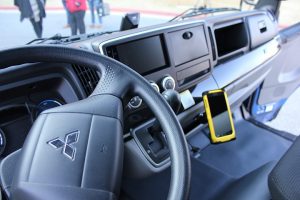J.B. Hunt reveals its first all-electric truck, 5 to haul bulky items to homes
by December 5, 2018 1:30 pm 2,101 views

Craig Harper, chief operations officer for J.B. Hunt, discusses the carrier’s new all-electric trucks, the Mitsubishi Fuso eCanter. They will be used in Houston and California.
J.B. Hunt Transport Services has added five Mitsubishi Fuso eCanter trucks to its fleet, and they are the Lowell-based carrier’s first all-electric trucks. The carrier on Wednesday (Dec. 5) had two of the trucks on display for the media at its corporate headquarters.
The trucks will haul freight for retailers and be used for home delivery of bulky items, such as appliances and furniture, said Craig Harper, chief operations officer for J.B. Hunt. With zero tailpipe emissions, they will cut carbon dioxide emissions compared to traditional trucks.
“We’ve always been trying to look at ways to reduce our carbon footprint,” Harper said. “We do a lot of that with our intermodal operations. Last year alone, we saved 3.5 million tons of carbon dioxide emissions by putting that freight on the train instead of having the trucks on the road hauling that freight. That’s equivalent to taking 700,000 cars off the road a year. It goes along again with our goals of having safe, reliable, efficient and sustainable transportation.”
The company didn’t disclose the purchase price of the trucks or whether they were leased or purchased, but compared to a conventional diesel truck, the operating costs for the eCanter are expected to be as much as $2,000 lower for every 12,000 miles driven. The eCanter has a driving range of 60-80 miles, and its battery can be charged up to 80% in one to two hours, Harper said.
The company acquired the trucks a few weeks ago and recently installed logos and branding on them. Charging stations have been installed at the terminals where they will be operating, and the trucks also can be charged at public stations. They are expected to start hauling freight in the next few weeks in the Houston area and in Santa Fe Springs, Calif.
“I have driven the truck, and it’s quite fun to drive,” Harper said. “When you ride in our other trucks, you get used to seeing and hearing all the shifting whether it’s an automatic or standard. With this truck, you actually touch the pedal, and you get acceleration. It’s quiet, and it’s a lot of fun to drive.”
The trucks will operate in the carrier’s Final Mile Services network, which is part of the Dedicated

Contract Services segment. In the third quarter, Final Mile Services revenue rose by $23 million, from the same period in 2017. Between the second and third quarters, the carrier added 598 trucks in its dedicated fleet, and 5% is related to Final Mile Services. At the end of the third quarter, J.B. Hunt had 17,229 trucks across its dedicated, intermodal and trucking segments, and nearly 10,000 of the trucks are in the dedicated segment.
J.B. Hunt is the second national carrier to introduce eCanter trucks in the United States, according to a news release.
“As the first major truck manufacturer to release a series-produced all-electric truck, Fuso is excited to work with supply chain leader J.B. Hunt in this industry milestone,” said Justin Palmer, president and CEO of Mitsubishi Fuso Truck of America Inc. “The eCanter demonstrates that the future of electric trucks is very possible and is no longer a prototype but a real truck delivering real goods daily.”
Also, J.B. Hunt disclosed it will purchase 40 Tesla Semi all-electric trucks. In November 2017, the company announced it had reserved multiple trucks to be used in the carrier’s intermodal and dedicated contract services segments to support operations on the West Coast. When asked when the company plans to receive those trucks, Harper said the company will wait and see and will put the trucks into operation as soon as it receives them. The trucks were expected to start to be delivered in 2019, and Harper said J.B. Hunt should be one of the first to receive the trucks.
Production of class 8 trucks, which are the largest truck class, are expected to continue to rise in 2019, but as demand changes for straight trucks, diesel engine orders will be impacted, according to transportation analysts ACT Research and Rhein Associates. The percentage of trucks produced that are class 8 is expected to fall from 73% in 2018 to 68% by 2021, said Tom Rhein, president of Rhein Associates. The percentage of trucks produced that are straight trucks is expected to rise to 32%. At the same time, the number of smaller diesel engines produced for class 8 trucks is expected to exceed larger engines for the first time in 2019.
“Diesel power is under attack long-term for use in on-highway commercial vehicles,” said Ken Vieth, general manager of ACT Research. “Alternative power is being developed, tested and refined, while diesel engines are also undergoing transition to become more fuel efficient and clean.”
Shares of J.B. Hunt (NASDAQ: JBHT) closed Tuesday (Dec. 4) at $100.63, down $4.38 or 4.17% after hitting a 52-week low of $99.63 on Tuesday. The 52-week high is $131.74. Markets were closed Wednesday in honor of former President George H.W. Bush, who died Friday (Nov. 30) at age 94. Funeral service for the 41st U.S. president was Wednesday in Washington, D.C. Markets will reopen Thursday (Dec. 6).
